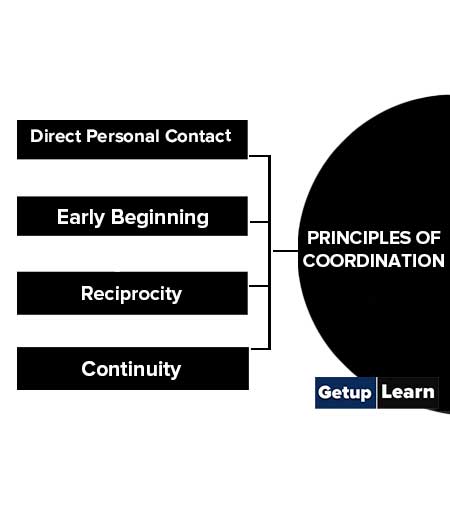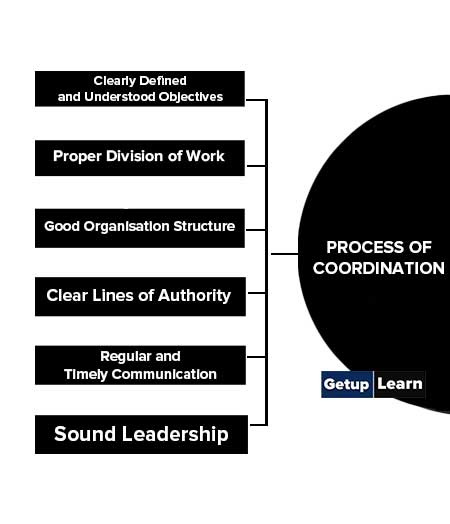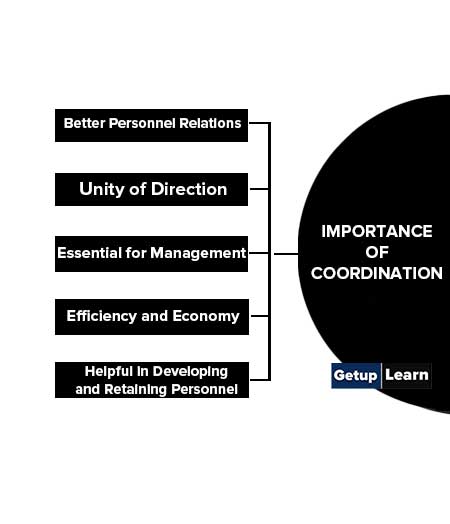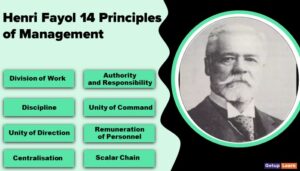Table of Contents
- 1 What is Coordination?
- 2 Definition of Coordination
- 3 Principles of Coordination
- 4 Effective Techniques of Coordination
- 5 Process of Coordination
- 6 Importance of Coordination
- 7 Objectives of Coordination
- 8 Problems of Coordination
-
9 FAQ Related to the Coordination
- 9.1 What is the meaning of coordination?
- 9.2 What is the definition of coordination?
- 9.3 What are the principles of coordination?
- 9.4 What are the effective techniques of coordination?
- 9.5 Which is an objective of the design coordination process?
- 9.6 What is the 5 importance of coordination?
- 9.7 What are the objectives of coordination?
- 9.8 What are the problems of coordination?
What is Coordination?
Coordination is concerned with harmonious and unified action directed toward a common objective. It ensures that all groups and persons work efficiently, economically and in harmony.
Coordination requires effective channels of communication. Person-to-person communication is most effective for coordination. Coordination is undertaken at every level of management.
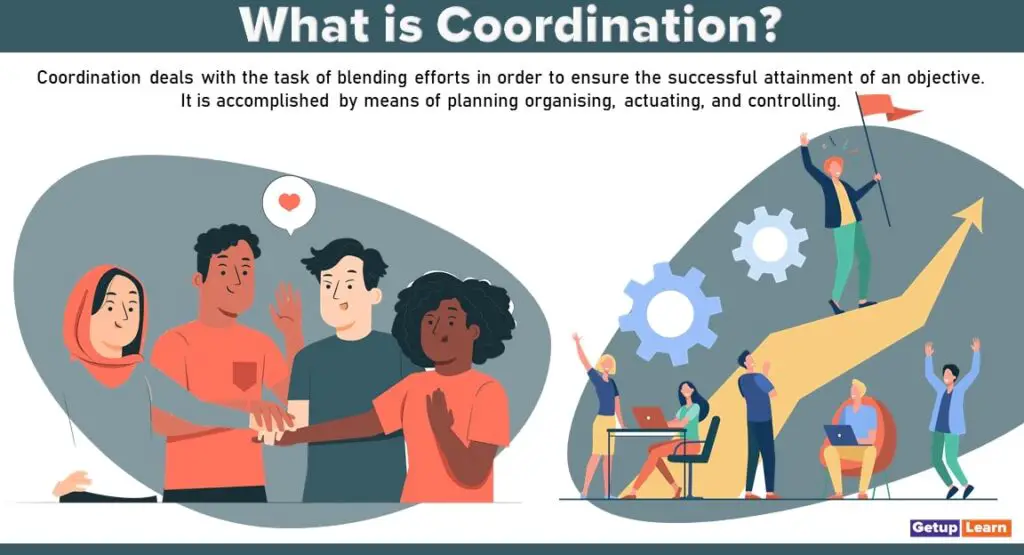
Coordination plays a very important role in every field of human activity. Coordination as the essence of management function achieves the objectives of an enterprise by directing and unifying group efforts.
The coordinator of an enterprise must also direct and coordinate the activities of various personnel so as to bring a unifying element in the task of managing and must be effected through the various functions of the management.
Definition of Coordination
These are some simple and easy definitions of coordination:
[su_quote cite=”E.F.L Brech”]Coordination is balancing and keeping together the team by ensuring a suitable allocation of tasks to the various members, and seeing that the tasks are performed with harmony among the members” Thus, bringing about harmony among members is an essence of coordination.[/su_quote]
[su_quote cite=”Henry Fayol”]To Coordinate is to harmonise all the activities of a person in order to facilitate its working and its success.[/su_quote]
[su_quote cite=”George Terry“]Coordination deals with the task of blending efforts in order to ensure the successful attainment of an objective. It is accomplished by means of planning organising, actuating, and controlling.[/su_quote]
[su_quote cite=”Neoman”]Coordination is a part of all phases of administration and it is not a separate and definite activity.[/su_quote]
Principles of Coordination
We have explained the principles of coordination:
Direct Personal Contact
According to this principle, coordination is best achieved through direct personal contact with the people concerned. Direct face-to-face communication is the most effective way to convey ideas and information and remove misunderstandings.
Early Beginning
Coordination can be achieved more easily in the early stages of planning and policy-making. Therefore, plans should be based on mutual consultation or participation. Integration of efforts becomes more difficult once the uncoordinated plans are put into operation. Early coordination also improves the quality of plans.
Reciprocity
This principle states that all factors in a given situation are interdependent and interrelated. For instance, in a group, every person influences all others and is in turn influenced by others. When people appreciate the reciprocity of relations, they avoid unilateral action and coordination becomes easier.
Continuity
Coordination is an ongoing or never-ending process rather than a once-for-all activity. It cannot be left to chance, but management has to strive constantly. Sound coordination is not fire-fighting, i.e., resolving conflicts as they arise.
Read More About: Principles of Coordination
Effective Techniques of Coordination
Every management will try to improve its working through proper coordination of work. The aim of every managerial function will be to reach organisational goals and this is facilitated only through coordination.
The purpose should be to achieve effective coordination. These are the effective techniques of coordination discussed as follows:
- Goals are Well Defined
- Simplified Organisation
- Effective Communication
- Effective Leadership
- Effective Supervision
- Cooperation
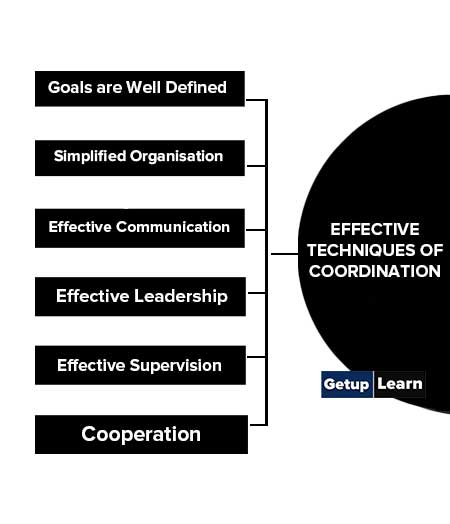
Goals are Well Defined
The goals of the organisation should be clear and well-defined. Everybody should know the objectives and his contribution towards their achievement. Unity of purpose will be achieved through proper coordination.
Simplified Organisation
The organisational structure should clearly define the authority and responsibility of each and every person. This will help in reducing conflicts among people. Over-specialisation of activities also creates problems of coordination.
There should be well-defined organisational charts, job descriptions, work manuals, etc. to avoid any type of misunderstanding. Coordination will be achieved when there are clear lines of authority and responsibilities.
Effective Communication
Effective communication helps in creating proper understanding among persons whose work needs to be coordinated. Through communication, every individual understands his scope, limitations, his position in the organisation and his relationship with others.
Regular communication among various persons helps in resolving conflicts and differences. People can understand the viewpoint of others in the organisation.
Effective Leadership
Effective leadership is essential for better coordination. A good leader is able to achieve coordination both at the planning and execution stages. If a leader is undecided about his task, he will not be able to guide or coordinate their activities.
Effective Supervision
Coordination can also be facilitated by effective supervision. A supervisor is a person who constantly watches the work of his subordinates. He can adjust the workload, and provide guidance to his subordinates if the situation demands.
A supervisor is an important person in coordinating the work at the execution level. He will keep the overall objectives of the organisation in mind and will direct the work of his subordinates in that direction.
Cooperation
Coordination can be achieved through the voluntary cooperation of employees. There should be a feeling of mutual help for each other. Cooperation can be brought about by keeping harmonious relations among employees.
Management should encourage formal and informal communication among employees. There should also be committees to take important decisions. The decisions of committees will be group decisions and everybody will cooperate in implementing them.
Read Also: 13 Methods of Coordination
Process of Coordination
Coordination cannot be achieved by force or imposed by authority. Achieving coordination through executive orders is a futile exercise. It can be achieved through person-to-person, side-by-side relationships. Achieving effective coordination is a sequential process.
These are the all steps which involve in the process of coordination:
- Clearly Defined and Understood Objectives
- Proper Division of Work
- Good Organisation Structure
- Clear Lines of Authority
- Regular and Timely Communication
- Sound Leadership
Clearly Defined and Understood Objectives
Every individual and each department must understand what is expected of them by the organisation. Top management must clearly state the objectives of the enterprise, as a whole.
As pointed out by Terry, “there must be commonness of purpose, in order to unify efforts”. The various plans formulated in the enterprise must be interrelated and designed to fit together.
Proper Division of Work
The total work must be divided and assigned to individuals in a proper way. Here, it is worth noting the principle, a place for everything and everything in its place.
Good Organisation Structure
The various departments in the organisation must be grouped in such a way that work moves smoothly from one phase to another. Too much specialisation may complicate the coordination work.
Authority must be delegated in a clear way. The individual must know, what is expected of him by his superior(s). Once authority is accepted, the subordinate must be made accountable for results, in his work area. There should be no room for overlapping of authority and wastage of effort(s).
Regular and Timely Communication
Personal contact is generally considered to be the most effective means of communication for achieving coordination. Other means of communication such as records, and reports, may also be used in order to supply timely and accurate information to various groups in an organisation.
As far as possible, common nomenclature may be used so that individuals communicate in the ‘same language’.
Sound Leadership
According to McFarland, real coordination can be achieved only through effective leadership. Top management, to this end, must be able to provide:
- A conducive work environment.
- Proper allocation of work.
- Incentives for good work, etc. It must persuade subordinates, to have an identity of interests and to adopt a common outlook.
Read More About: Process of Coordination
Importance of Coordination
Coordination is important in many different contexts because it helps ensure that people, tasks, and resources are aligned and working together effectively. In the workplace, coordination can be especially important for ensuring that projects are completed efficiently and on time and that all team members are aware of their roles and responsibilities.
Coordination can also be important in other settings, such as in social and sports activities, where it helps ensure that everyone is working towards a common goal and that their efforts are coordinated and complementary.
These are the importance of coordination given below:
- Better Personnel Relations
- Unity of Direction
- Essential for Management
- Efficiency and Economy
- Helpful in Developing and Retaining Personnel
Better Personnel Relations
Management and staff create cordial human relations through coordination. The points of dispute or conflict among different persons, between line and staff, etc. can be settled by mutual discussions. Better personal relations are also helpful in increasing the morale of employees which ultimately leads to job satisfaction.
The results of coordinated group efforts will be much better than the sum results of different individuals. The members will willingly and wholeheartedly contribute towards the success of the enterprise. Therefore, coordination is necessary to bring unity of action to the organisation.
Unity of Direction
Coordination helps in creating unity of direction. Different segments of the business may set different goals. The coordination process helps in synchronising various efforts. It motivates various employees to view their work from the standpoint of the business.
In the absence of coordination, there may be conflicting goals and everybody may perceive the objectives in a different way. This will create confusion and chaos in the organisation. It will help in reconciling conflicting views.
Essential for Management
The increase in the size of organisations has brought a number of complexities. There is a degree of specialisation, division of labour and a large number of individuals.
Everybody has his own personality traits and ways of working. It is essential to synchronise the work of all persons in the organisation. Coordination helps in bringing unity of action for achieving business goals.
Efficiency and Economy
Coordination promotes efficiency and economy in the organisation. By coordinating activities efficiency is brought into the work. It also helps in avoiding delays and eliminating duplication of efforts. This will result in saving time and energy, thus bringing the economy to the business.
Helpful in Developing and Retaining Personnel
Coordination by synchronising various activities helps in promoting team spirit among organisational personnel. There will be no conflict or confusion in the division of work and everybody will try to improve his own performance.
This helps in developing potentialities of every person in the organisation. Coordination also helps in promoting job satisfaction among employees by giving them personal contentment. The concern will be able to retain the services of good employees.
Read More About: Importance of Coordination
Objectives of Coordination
Let’s discussed the objectives of coordination:
- Encourages Team Spirit
- Gives Proper Direction
- Facilitates Motivation
- Makes Optimum Utilisation of Resources
- Helps to Achieve Objectives Quickly
- Improves Relations in Organisation
- Leads to Higher Efficiency
- Improves Goodwill of Organisation
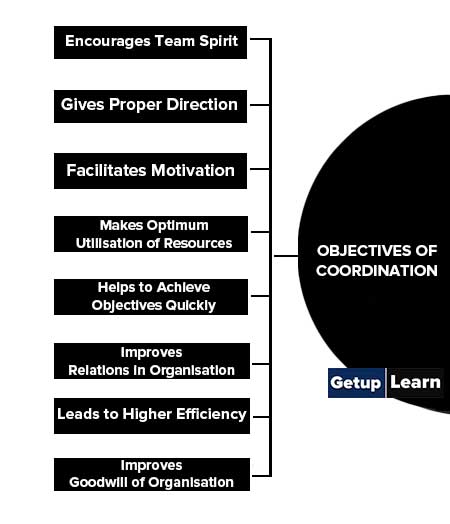
Encourages Team Spirit
There exist many conflicts and rivalries between individuals, departments, a line and staff, etc. Similarly, conflicts are also between individual objectives and organisational objectives. Coordination arranges the work and the objectives in such a way that there are minimum conflicts and rivalries.
It encourages the employees to work as a team and achieve the common objectives of the organisation. This increases the team spirit of the employees.
Gives Proper Direction
There are many departments in the organisation. Each department performs different activities. Coordination integrates (brings together) these activities for achieving the common goals or objectives of the organisation. Thus, it gives proper direction to all the departments of the organisation.
Facilitates Motivation
Coordination gives complete freedom to the employees. It encourages the employees to show initiative. It also gives them many financial and non-financial incentives. Therefore, the employees get job satisfaction, and they are motivated to perform better.
Makes Optimum Utilisation of Resources
Coordination helps to bring together the human and material resources of the organisation. It helps to make optimum utilisation of resources. These resources are used to achieve the objectives of the organisation. It also minimises the wastage of resources in the organisation.
Helps to Achieve Objectives Quickly
Coordination helps to minimise conflicts, rivalries, wastages, delays and other organisational problems. It ensures the smooth working of the organisation. Therefore, with the help of coordination, an organisation can achieve its objectives easily and quickly.
Improves Relations in Organisation
The Top Level Managers co-ordinates the activities of the Middle-Level Managers and develop good relations with them. Similarly, the Middle-Level Managers coordinate the activities of the Lower Level Managers and develop good relations with them.
Also, the Lower Level Managers coordinate the activities of the workers and develops good relations with them. Thus, coordination overall improves the relations in the organisation.
Leads to Higher Efficiency
Efficiency is the relationship between Returns and Cost. There will be higher efficiency when the returns are more and the cost is less. Since coordination leads to the optimum utilisation of resources it results in more returns and low costs. Thus, it leads to higher efficiency.
Improves Goodwill of Organisation
Coordination helps an organisation sell high-quality goods and services at lower prices. This improves the goodwill of the organisation and helps it earn a good name and image in the market and corporate world.
Problems of Coordination
Coordination is essential, large business enterprises due to their large number of departments, like production, purchase, sales, finance, personnel etc. find it difficult to coordinate. These departments of large enterprises find it hard to collaborate with each other due to the differences in their attitudes and working styles.
These are some problems of coordination occur in the way:
- Natural Hindrance
- Lack of Administrative Talent
- Lack of Technique of Coordination
- Ideas and Objectives
- Misunderstanding
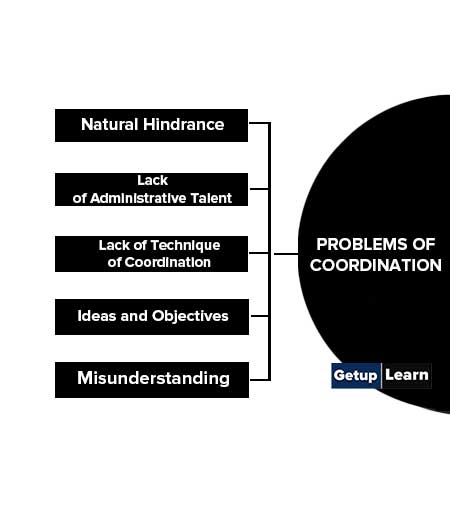
Natural Hindrance
It is present in all organisations which stops the process of coordination hence it is the responsibility of the management to solve this problem.
Lack of Administrative Talent
Good coordination is absent in those organisations where the administrator doesn’t have the required talents of maintaining proper coordination. Therefore the effect could be seen straight in the production of the unit.
Lack of Technique of Coordination
In the non-availability of techniques which we have discussed above, the whole process of proper functioning of an organisation will be uneven.
Ideas and Objectives
This is a very big problem without solving or without finding a solution for this the existence of coordination is impossible. When the employees have different goals and objective from the organisational goals problems of coordination exists.
Misunderstanding
In case of a misunderstanding between the employees and the line managers, the coordination of the organisation will be affected.
What is the meaning of coordination?
Coordination refers to balancing, timing and integrating activities in an organisation. Business involves multiple operations, manifold policies, varied skills, administrative processes and actions, wherein different managers display their talents in different roles. All these business activities, carried on by different departments should contribute to the achievement of the common objectives of an enterprise.
What is the definition of coordination?
Coordination deals with the task of blending efforts in order to ensure the successful attainment of an objective. It is accomplished by means of planning organising, actuating, and controlling.
What are the principles of coordination?
The following are the principles of coordination:
1. Direct Personal Contact
2. Early Beginning
3. Reciprocity
4. Continuity.
What are the effective techniques of coordination?
The following are the effective techniques of coordination:
1. Goals are Well Defined
2. Simplified Organisation
3. Effective Communication
4. Effective Leadership
5. Effective Supervision
6. Cooperation.
Which is an objective of the design coordination process?
The following are the objective of the design coordination process:
1. Clearly Defined and Understood Objectives
2. Proper Division of Work
3. Good Organisation Structure
4. Clear Lines of Authority
5. Regular and Timely Communication
6. Sound Leadership.
What is the 5 importance of coordination?
The following are 5 importance of coordination given below:
1. Better Personnel Relations
2. Unity of Direction
3. Essential for Management
4. Efficiency and Economy
5. Helpful in Developing and Retaining Personnel.
What are the objectives of coordination?
The following are the objectives of coordination:
1. Encourages Team Spirit
2. Gives Proper Direction
3. Facilitates Motivation
4. Makes Optimum Utilisation of Resources
5. Helps to Achieve Objectives Quickly
6. Improves Relations in Organisation
7. Leads to Higher Efficiency
8. Improves the Goodwill of the Organisation.
What are the problems of coordination?
The following are the problems of coordination:
1. Natural Hindrance
2. Lack of Administrative Talent
3. Lack of Technique of Coordination
4. Ideas and Objectives
5. Misunderstanding.

